Environmental
Green Management
Hyosung, through its Green Management Vision 2030, aspires to lead a better life for humanity as an environmentally friendly company.
Green Management VISION 2030
Link CopyBased on our four objectives of reducing greenhouse gas emissions, developing environmentally friendly technologies and expanding the market, establishing an environmentally friendly corporate culture, and enhancing stakeholder trust, we establish and implement company-wide climate change response strategies by assigning specific responsibilities for each objective.
Greenhouse gas Emissions Reduction
Reduce greenhouse gas emissions by more than 14.5% by 2030 compared to 2018
- Reduce greenhouse gas emissions through external reduction programs such as the SDM* under the Paris Agreement *Sustainable Development Mechanism (SDM): A sustainability framework under the Paris Agreement
- Reduce greenhouse gas emissions through energy-saving activities at business sites and the expanded adoption of renewable energy
- Ensure efficient greenhouse gas management through the operation of company-wide carbon asset management systems and the product carbon footprint calculation system
- Establish a process to identify climate change-related risks and opportunities for risk hedging and opportunity discovery
Sustainable Technologies
Pursue market development and business expansion through development of environmentally friendly technologies
- Achieve low-carbon, green growth by expanding renewable energy businesses such as hydrogen, solar, and wind power
- Expand environmentally friendly technological capabilities, such as biodegradable ester oil-based transformers, SF6 gas alternative insulated switchgear, and non-toxic plastics like polyketone
- Expand circular economy products, such as yarn made from recycled PET bottles and discarded fishing nets, and recycled car mats
- Develop new markets through energy-efficient technologies such as HVDC and STATCOM
Environmentally friendly Culture
Foster a corporate culture through environmentally friendly infrastructure
- Minimize environmental pollution by advancing water and air pollutant management systems
- Reduce water consumption through water recycling and reduce waste emissions through resource reuse
- Promote ongoing mutual growth and collaborative partnership through energy reduction consulting and equipment installation support for partner companies
- Increase purchases of environmentally friendly and green technology products to build sustainable infrastructure
Transparent Information Disclosure
Enhance stakeholder trust through transparent information disclosure
- Build a green management system by expanding green and environmentally friendly certifications
- Build stakeholder trust by participating in the Carbon Disclosure Project (CDP*)
and environmental information disclosure systems *Carbon Disclosure Project (CDP): A global carbon disclosure initiative - Voluntarily participate in international climate change initiatives
- Engage in active communication with local communities and promote environmental cleanup activities
through the “One Company, One River/Park/Mountain” campaigns initiatives
Green Management Promotion Organiztion
Link CopyIn April 2021, Hyosung underwent a restructuring of the existing Transparent Management Committee under the BoD into the ESG Management Committee. This committee now encompasses environmental and social aspects with expanded roles in deliberating and making decisions on significant ESG management issues. These include formulating ESG-related policies and goals including climate change, risk management, and investment and activity plans. With the former Minister of Environment serving the BoD, the ESG Management Committee handles diverse topics, including the establishment of green management vision, tackling climate change-related issues (e.g. Greenhouse gas emissions, oversupply and deficit of emission allowances), the development of environmentally friendly products and technologies, and investments in ERP systems and environmental facilities for green management.
Furthermore, in July 2021, we integrated the two independent committees—EHS and CSR—into the ESG Management Promotion Committee chaired by the CEO so as to promote not only EHS management but also social and governance initiatives. The ESG Management Promotion Committee meets quarterly to address specific ESG management matters and select agenda items to be presented or reported to the BoD. The R&D Committee, consisting of the CEO and top management, meets twice a year to formulate R&D strategies based on input from relevant departments ranging from sales and marketing to development and research, with a focus on climate change.
As for dedicated organizations, we have an ESG management organization directly under the CEO's control and the Green Management Department within the Strategy Division to develop green and ESG management strategies, implement management, and disclose performance. The Power Generation Environment Team and the Production Department are responsible for reducing energy consumption and Greenhouse Gas emissions, whereas environment-related departments take charge of managing pollutant-emitting facilities and reducing pollutants at business sites.
Decision-making body
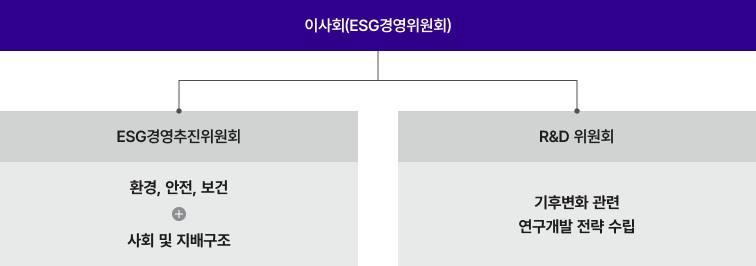
- ESG Management Promotion Committee
-
Environment, Safety and Health
Social and Governance
- R&D Committee
-
Establishing R&D Strategies
for Climate Change
Working-Level Organizations
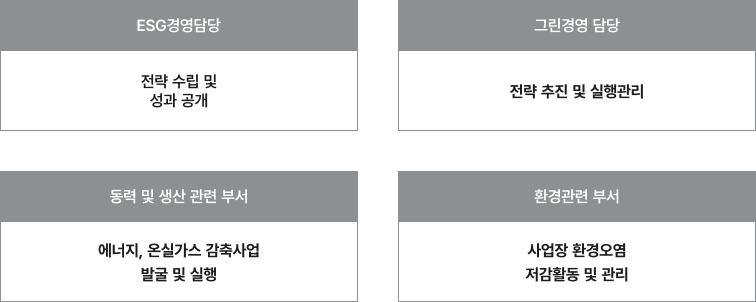
- ESG Management Department
-
Strategy establishment
and performance disclosure
- Green Management Department
-
Strategy promotion
and execution management
- Departments related to power
generation and production -
Discovery and execution of energy
and Greenhouse gas reduction projects
- Departments
related to environment -
Pollution reduction activities and
management at business sites
Sustainable Products & Services
Link CopyHyosung has established its own classification system for sustainable products and services based on Korea’s Green Taxonomy and environmental certifications. This ensures the prevention of greenwashing across Hyosung and enables transparent communication with stakeholders. Hyosung also continuously monitors changes in the Green Taxonomy and updates its system accordingly to enhance alignment and classification accuracy for sustainable products.
Sustainable Product Standards
-
1.
Environmentally friendly, sustainable, low-carbon and green-certified products under domestic Acts, subordinate statutes, and institutions
Product Table Product Tittle Product Info Green products Products that minimize the input of energy and resources and the generation of greenhouse gases and pollutants, in accordance with the Framework Act on Carbon Neutrality and Green Growth for Coping with Climate Crisis. Environmentally label certified products Products that are subject to environmentally label certification in accordance with the Environmental Technology and Industry Support Act Low-carbon products Products that have obtained environmental product declaration certification in accordance with the Environmental Technology and Industry Support Act and that reduce the emission of greenhouse gases in accordance with the Act on Carbon Neutrality and Green Growth for Coping with the Climate Crisis. Good recycled products Products that are subject to quality certification for recycled products, determined and announced by the Minister of Trade, Industry and Energy in accordance with the Act on the Promotion of Saving and Recycling of Resources and the Industrial Technology Innovation Promotion Act High-efficiency equipment Equipment certified for high energy efficiency, in accordance with the Energy Use Rationalization Act. Korean Green Taxonomy
(K-Taxonomy)Products manufactured through economic activities contributing to the Korean Green Taxonomy
(K-Taxonomy).Other green products Other products designated as green products by the Minister of Environment. -
2.
Environmentally friendly, sustainable, low-carbon and green-certified products under foreign Acts, subordinate statutes, and institutions, such as the USDA BioPreferred Program, EU Ecolabel, Nordic Swan Ecolable, etc.
-
3.
Environmentally friendly, sustainable, low-carbon and green-certified products from internationally trusted independent certification authorities, such as the Global Recycled Standard (GRS), Recycle Claim Standard (RCS), ISCC PLUS, SGS ECO-Product, OEKO-TEX, Green Seal, ENERGY STAR, etc.
Sustainable Product and Services Classification System
- Hyosung Corporation
- Hyosung TNC
- Hyosung Heavy Industries
- Hyosung Chemical
| Category | Definition | Products and Services |
|---|---|---|
| Greenhouse Gas Emissions Reduction |
Utilization of raw materials with low global warming potential |
Gas Insulated Switchgear (GIS) that use SF6 alternatives gas |
|
Products with a lower carbon footprint than current products |
New material engineering plastic POKETONE |
|
|
Increasing energy efficiency |
Premium electric motors Electronically Commutated (EC) fan |
|
|
Production based on renewable (bio-based) materials |
Regen bio-based spandex Bio-polyester yarn / automotive carpet Bio-based TAC (Tri-acetyl Cellulose) film |
|
|
New and renewable energy (hydrogen, wind, solar) technologies |
Hydrogen charging stations, hydrogen engine generators Wind power generation systems Solar inverters and EPC services |
|
|
Contribution to renewable energy transmission and distribution infrastructure and grid stabilization |
Direct Current Transmission and Distribution System (HVDC), STATCOM, Energy Storage System (ESS), Variable Reactor for Renewable Power Generation |
|
| Climate Change Adaptation |
Obtaining the Green Standards For Energy and Environmental Design (G-SEED) |
Construction of green buildings |
| Sustainable Water Conservation |
Wastewater treatment Products and services providing clean drinking water Acquisition of environmental certification (Environmental New Excellent Technology, Green Technology) |
Submerged membrane technology for water treatment Pressurized membrane technology for water treatment |
| Circular Economy |
Application of recycled raw materials Acquirement of certification for using recycled materials |
Regen Nylon: Recycled nylon from manufacturing waste Regen Ocean Nylon: Recycled nylon from wasted fishing nets Regen Polyester: Recycled polyester from discarded Regen Ocean Polyester*: Recycled polyester from waste discarded Regen Spandex: Recycled spandex from manufacturing waste Recycled yarn / automotive carpets PCR-PP (Post Consumer Recycled Poly Propylene) |
|
Products designed to improve recyclability by simplifying materials |
Recyclable automotive carpets |
|
| Pollution Prevention and Management |
Reducing the use or emission of pollutants Acquisition of environmental certification (Environmental New Excellent Technology, Green Technology) |
Polyester with antimony (Sb)-free catalyst Dope-dyed yarn without the need for dyeing process Transformer that are insulated with biodegradable ester oils |
Environmental Management System
Link CopyHyosung Corporation has established and operates an environmental management system in accordance with ISO 14001.

- 1. Organizational
Situation
Management - 2. Risk
Management - 3. Environmental
Impact Assessment - 4. Legal & Policy Management
- 5. Environmental Permits
- 6. Green
Management
Activities - 7. Compliance
Evaluation
Management - 8. Change
Management
-
1.
Environmental operation and management process
- Management of organizational status
- The ESG Management Promotion Committee, under the supervision of the CEO, manages and makes decisions on ESG issues, including the environment, the ESG management organization under the CEO conducts strategy establishment and performance disclosure, and the Green Management Department of the Strategy Division conducts strategy promotion and execution management.
- The utility and production department in the workplace manages energy consumption and greenhouse gas emissions, and the environment-related department systematically implements environmental pollution reduction activities and management.
- Risk management
- Through our risk management system, we recognize the risks inherent in various factors in the environmental sector, such as climate change, environmental regulations, and hindrances to green management activities, and prevent the potential impact of risks through risk analysis. We check whether the risk response measure is properly applied and prevents a recurrence.
- Impact assessment
- We assess the significant and potential environmental impacts of all activities related to production, products, and services in terms of green management. These impacts are evaluated based on predefined criteria, registered, and managed for improvement.
- Legal and policy management
- Hyosung rapidly identifies new or revised laws and policies from a government agency, international convention, or local government. We ensure strict compliance through dissemination and education, apply evaluation standards on our compliance, and inspect the green management system.
- Environmental permits and licenses
- In the case of installing or changing a discharge or pollution control facility, we receive a review, inspection, and evaluation from government ministries and public and private organizations.
- Green management operation activities
-
Waste management
By optimizing the inventory and usage management of raw and subsidiary materials, Hyosung makes persistent efforts to cut down on waste generation by promoting the reuse and recycling of a higher proportion of waste produced during its manufacturing processes.
-
Water management
In order to minimize the impact on rivers and seas, water pollutants are managed with internal standards that are stronger than legal standards. Our facilities eliminate pollutants physically, chemically, and biologically, and our telemonitoring system (TMS) is operated under the automated water quality measurement system.
-
Air quality management
Hyosung has upgraded waste treatment facilities and uses clean fuels to reduce air pollutants and emissions. Furthermore, we devise plans with stricter standard compared to the legal acceptance level to control air pollution and improve air quality in various sectors.
-
Chemical management
In the entire process of purchasing, using, selling and disposing of chemical substances, Hyosung prevents incidents associated with chemical substances by removing environmental, safety, and health hazards in advance. Hyosung controls all chemical substances used in its production processes through an ERP based electronic system, verifying whether they contain regulated chemicals. When procuring chemicals, we require Material Safety Data Sheet (MSDS) and Letters of Confirmation(LOC) from suppliers. Only materials approved after confirming their regulatory status in the Electronic Chemical Management System (ECMS) are eligible for purchase. Our electronic system ensures compliance with the Toxic Chemicals Control Act and the Act on the Registration and Evaluation, etc. of Chemical Substances, enabling systematic data management of all chemical substances. We maintain transparency by submitting and disclosing information on chemical substance performance, emissions, and statistical data to the Ministry of Environment.
- Compliance evaluation
- Hyosung established an evaluation system based on internal standards that have been reinforced beyond the level required by laws and regulations for green management operation activities. We conduct evaluations accordingly. We check environmental performance indicators every year, establish and manage environmental performance goals, and carry out green management activities according to plans.
- Change management
- Hyosung identifies and analyzes all risks resulting from changes in raw materials including chemical substances, facilities, process design, operating conditions, pollutant-emitting facilities, off-site risk assessments, process safety management, and relevant laws and regulations. We review any changes in time to verify suitability and effectiveness, report the result of changes, and carry out training to prevent risks in advance.
- 2. Green management communication
- 3. Education and training
- 4. Emergency response to environmental and safety risks
Environmental Efforts
Link Copy-
Azalea Festival at the Anyang Plant
The hill inside the Hyosung Anyang Plant is covered with the beautiful Rhododendron colony spanning 10,000 m2 and is also known as “Azalea Hill.” Azalea Hill is one of 49 tourist attractions selected by Anyang local citizens.
During the azalea festival, the Anyang Plant opens its doors to the local community, offering them an opportunity to admire the vibrant pink blooms. Every year, approximately 10,000 people visit the festival, enjoying the breathtaking scenery.
- Plogging with employees and Seoul citizens
- Commitment to Environmentally Friendly Product Innovation
- Open Innovation Project (Support for environmentally friendly fiber startups)
Biodiversity Efforts
Link CopyAs the ecosystem continues to be destroyed by climate change, the obligation to preserve biodiversity is emerging. Hyosung supports and participates in efforts to preserve and promote biodiversity in order to nurture a thriving ecosystem for coming generations.
Biodiversity Policy
Hyosung corporation recognizes biodiversity conservation as a critical global environmental issue linked to climate change and is committed to preserving biodiversity and promoting the sustainable use of natural resources, with the ultimate aim of contributing to the improvement of humanity’s quality of life.
| Year | Activity | Description |
|---|---|---|
| 2022~ | Seagrass forest management Project | Marine protected species management program |
| 2023~ | Mountain goats conservation Project | Habitat protection for endangered species |
| 2023~ | Feeding winter migratory birds Project | Conservation of endangered species |
| 2024~ | Demilitarized Zone(DMZ) ecological restoration Project | Forest ecosystem restoration |
| 2024~ | Artificial breeding of endangered insects Project | Conservation of endangered insect species |
Seagrass Forest Management Project
Together with the Korea Fisheries Resources Agency, Hyosung engages in a management project for seagrasses (eelgrasses) grown in Dadae-ri and Dapo-ri of Geoje-si, Gyeongsangnam-do. Seagrasses are species designated as endangered marine plants by the Conservation and Management of Marine Ecosystems Act. They play a vital role in the marine ecosystem by providing food, habitat, and spawning grounds, and are one of the blue carbon whose ability to absorb carbon has also been certified internationally. Hyosung conducts activities to improve the marine environment, including monitoring the state of business sites subject to management of the seagrass forest created by the Korea Fisheries Resources Agency, monitoring the habitat, planting supplementary seagrasses, and retrieving abandoned fishing gear. When a seagrass forest is established, the number of benthic animals, the number of species present, and the species diversity index increase 2.5-fold, 1.5-fold, and 1.2-fold, respectively, ensuring a healthy marine ecosystem. Hyosung intends to expand the Seagrass Forest Restoration Project in the future.
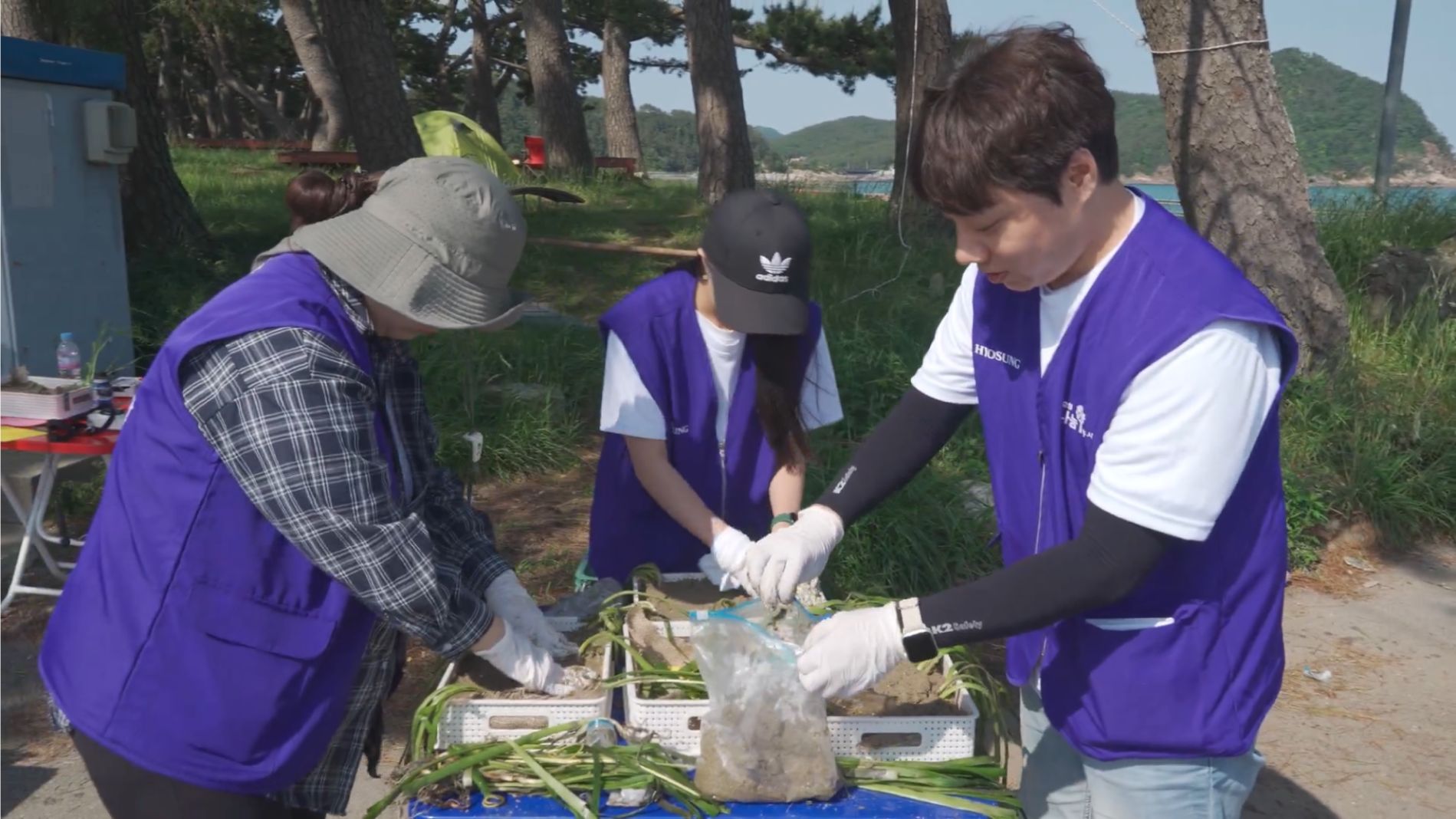
Feeding Winter Migratory Birds Project
We are conducting a feeding support project for winter migratory birds that visit the Hwapocheon Wetland in Gimhae, South Gyeongsangnam-do, a national wetland conservation area. To prevent exhaustion and starvation of winter migratory birds (eagle, whooper swan, bean goose, etc.) that come to Korea for winter, we support stable and continuous feeding to protect endangered animals and plants and preserve biodiversity. Under the project carried out in 2023, the number of visiting individuals rose from 8,161 in 2022 to 8,876 in 2023.
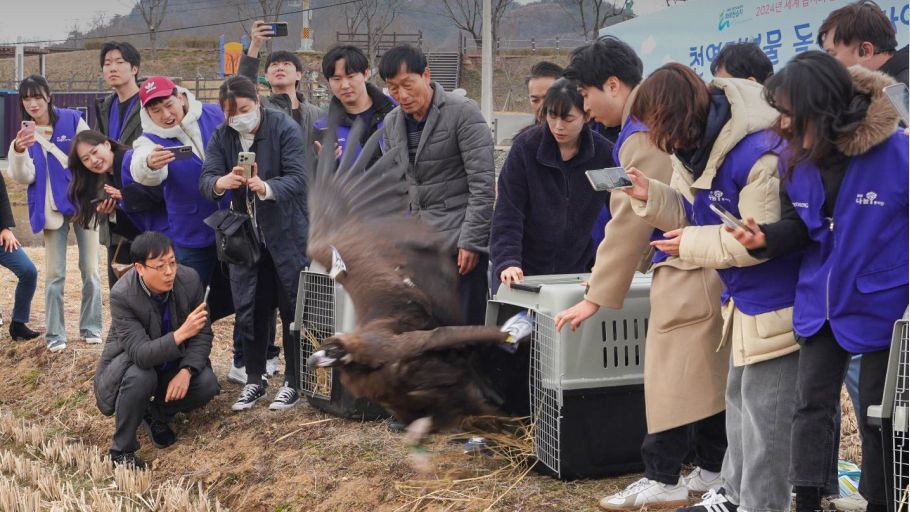
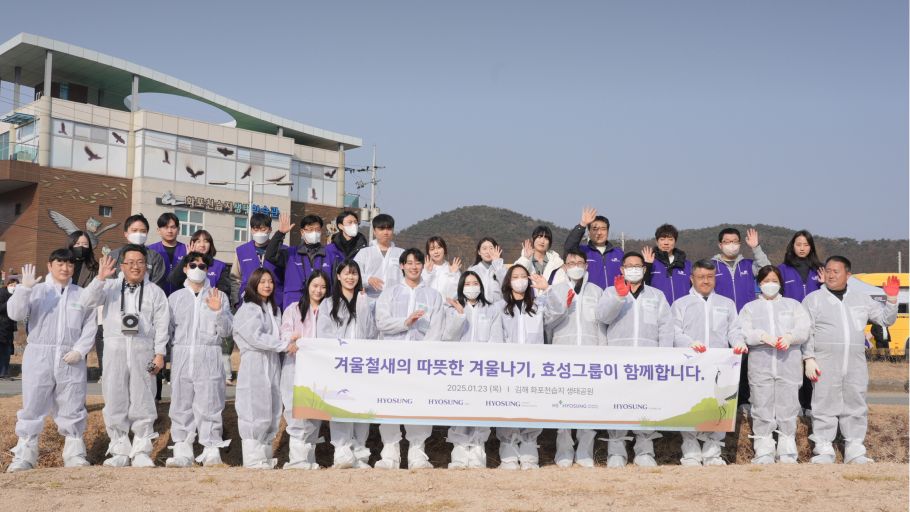
(eagle, whopper swan, bean goose, etc)
Mountain Goats Conservation Project
Hyosung is carrying out a project to support the installation of wire fence to protect endangered species such as mountain goats and other wildlife living in Yeongyang-gun, Gyeongsangbuk-do. In order to prevent damage to crops, wild animals, including mountain goats, have been caught and killed in the mesh fence, so we are supporting the changing of existing mesh fences with wire fences to prevent damage to wild animals and protect farms.
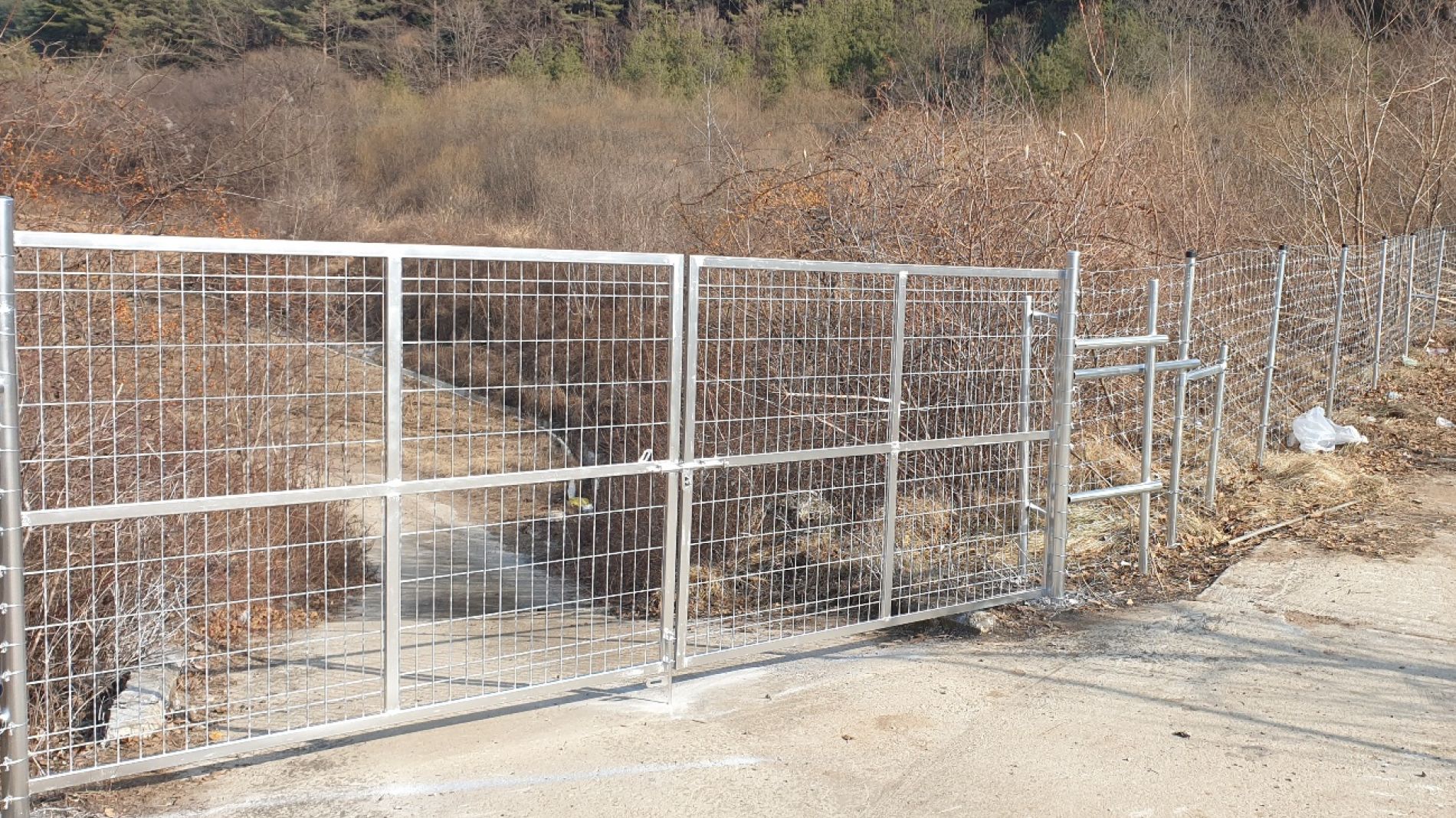
Artificial Breeding of Endangered Insects Project
Hyosung is collaborating with the National Institute of Ecology and a social enterprise specializing in entomology to promote the artificial breeding and restoration of endangered insect species and natural monuments, such as jewel beetles, dung beetles, and giant water bugs. In addition, Hyosung organizes insect release events with its employees, including a jewel beetle release event at Pyochungsa Temple in Miryang, Gyeongsangnam-do. The company plans to continue supporting initiatives aimed at increasing the number of insects released into the wild.
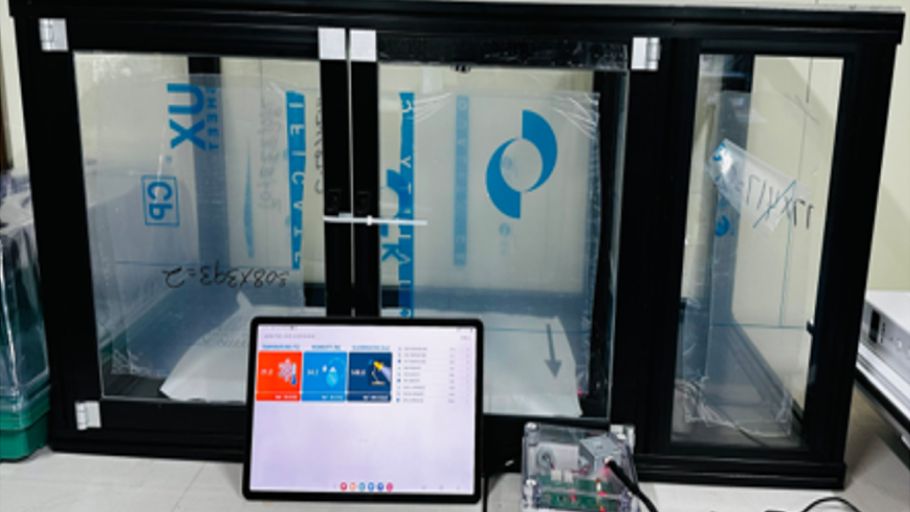
propagated Jewel Beetle
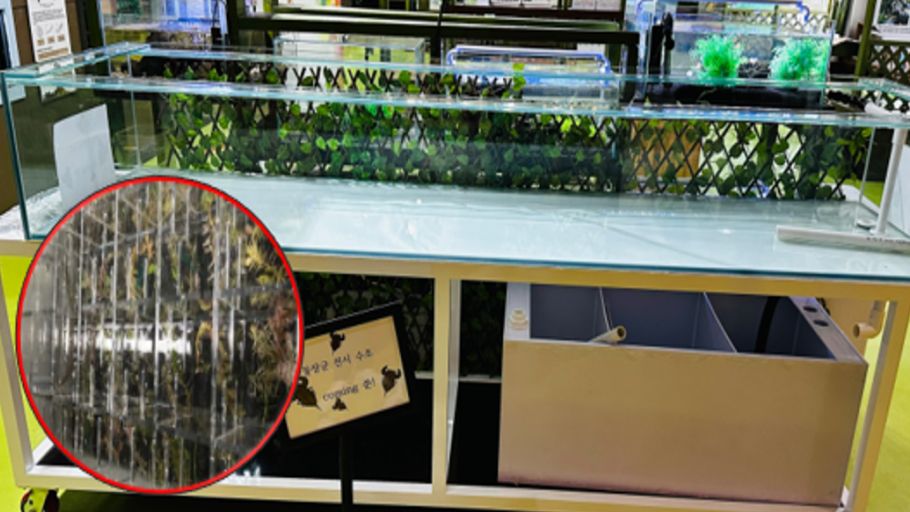
and separated habitat system

